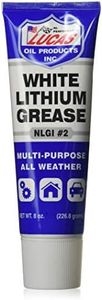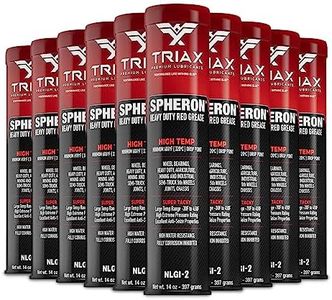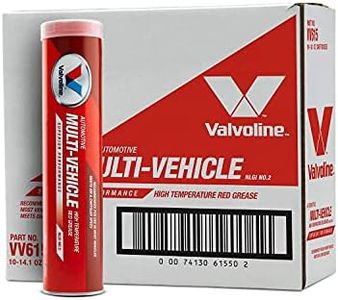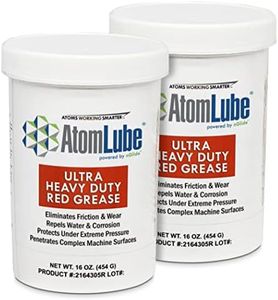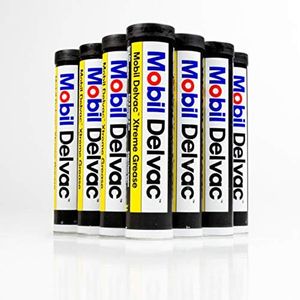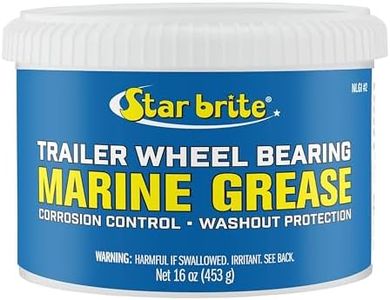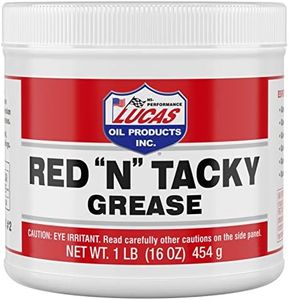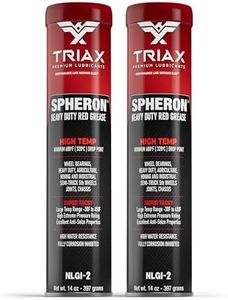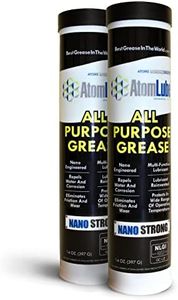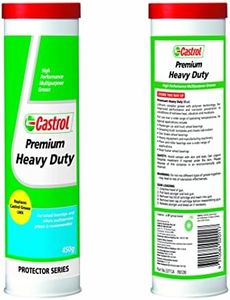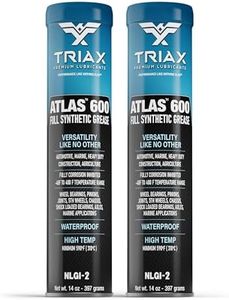We Use CookiesWe use cookies to enhance the security, performance,
functionality and for analytical and promotional activities. By continuing to browse this site you
are agreeing to our privacy policy
10 Best Wheel Bearing Greases
From leading brands and best sellers available on the web.By clicking on a link to a third party's website, log data is shared with that third party.
Buying Guide for the Best Wheel Bearing Greases
Choosing the right wheel bearing grease is crucial because this grease protects the bearing from wear, extreme temperatures, and moisture, ensuring smooth operation and long life for wheel bearings. While all grease helps reduce friction and protect against corrosion, not every type is optimized for wheel bearings. The wrong choice can mean more maintenance, premature wear, or even bearing failure. To select the best fit, consider how you plan to use the vehicle, the environment you'll drive in, and the type of wheels or machinery you're working on.Base TypeWheel bearing greases can be made with different base materials, such as lithium, calcium, or synthetic compounds. The base type determines how well the grease resists heat, water, and pressure. Lithium-based greases are common for general automotive use because they're versatile and protect well against water and heat. Calcium-based greases are excellent for resisting water, making them better for wet environments. Synthetic greases are designed for the most demanding conditions, like extreme temperatures or heavy loads. To choose the right base type, consider your driving conditions: regular vehicles do well with lithium, trailers or boat areas might benefit from calcium, and if you need maximum protection or deal with high performance or extreme climates, look at synthetic.
Temperature RangeThe temperature range tells you the minimum and maximum temperatures the grease can handle before it starts breaking down. This matters because wheel bearings can get very hot during use, especially at high speeds or under heavy loads. Greases with lower temperature ratings might be fine for everyday driving but won't last in harsh conditions, while high-temperature greases are better for performance vehicles or applications involving lots of braking or towing. Assess your typical use: for standard city or highway driving, a regular temperature range is enough; for off-road, racing, or frequent braking, you’ll want something rated for higher heat.
Water ResistanceWater resistance refers to the grease's ability to prevent water intrusion that can wash away lubrication and lead to rust. For most cars, good water resistance is needed to handle rain or road spray. However, if you drive in wet environments, tow a boat, or use trailers near water, you need the best water resistance possible. Grease labeled as 'marine' or 'waterproof' is ideal for such conditions. Pick higher water resistance if exposure to moisture is frequent, otherwise, standard water-resistant grease should suffice.
NLGI GradeNLGI grade measures how thick or soft the grease is, on a scale where 2 is the most common for wheel bearings. A grade 2 has a peanut butter-like consistency that's easy to apply and stays in place during movement. Lower grades (softer) might leak out and higher grades (stiffer) may not flow well where needed. For almost all automotive wheel bearings, NLGI 2 is the standard and recommended. Other grades are better suited to specialized machinery, so unless you have unusual needs, stick with grade 2 for wheel bearings.
Additives and EP RatingSome greases contain additives for extra protection, such as Extreme Pressure (EP) additives that help when bearings face heavy loads or shock. These prevent the grease from breaking down under tough conditions. EP-rated grease is especially recommended for vehicles towing trailers, carrying heavy loads, or operating in rugged conditions. If your use is standard light or personal vehicle driving, you may not need special additives, but for heavy-duty tasks, look for greases with EP additives and this should be stated clearly on the package.
